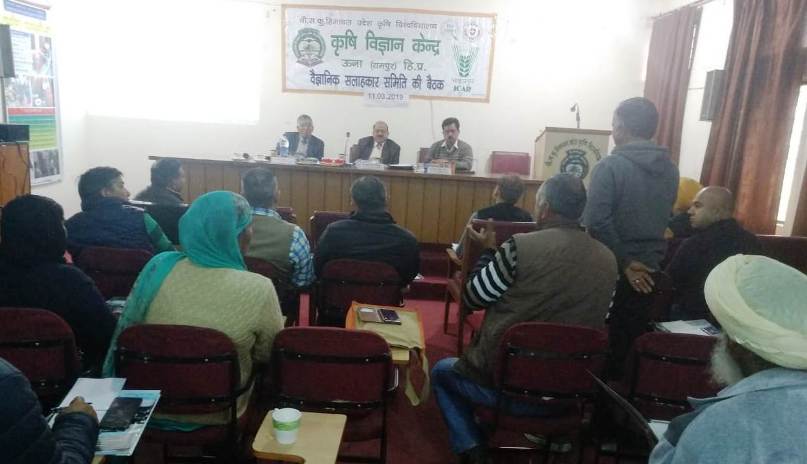
||Archive News||
**********************************
Last Updated: March 12, 2019
Media Cell
Press Release
No. QSD/MC/299 Dated: 12.03.2019
Scientific Advisory Committee Meetings at KVKs at Dhaulakuan & Una
Vice Chancellor Prof. A.K. Sarial asks extension specialists to organise frontline demonstrations and on-farm trials on natural farming
Palampur 12 March. Krishi Vigyan Kendras of CSK Himachal Pradesh Agriculture University organised Scientific Advisory Committee (SAC) meetings at Dhaulakuan (Sirmour) and Una to discuss the work done in the last one year and formulate action plan for the next year. Prof. Ashok Kumar Sarial, Vice Chancellor, chaired both the meeting and addressed the SAC members of both KVKs.
The Vice-Chancellor told that a massive programme has been initiated to turn Himachal Pradesh into a natural farming state and the university was extending all possible support in this mega effort. He told that whole hearted involvement of farming community was required for this movement and asked scientists, farm officers and progressive farmers to spread the word among stake holders. Prof. Ashok Kumar Sarial detailed the research and extension education efforts of the University in natural farming at Palampur and all KVKs. He asked the extension specialists to educate farmers and general masses about the ill effects of excessive use of chemicals in the crops. He said that on-farm trials and front line demonstrations on naturalfarming should be organized and field data so generated should be compiled and used in publications for the benefit of farming community. He also detailed about Agri-Business Incubator programme of the university to promote innovation and Agri-entrepreneurship and asked young farmers to avail the facility. He said that income of the farmers should be increased with the active support of scientific knowledge and asked the farming community to avail assistance from KVKs of their respective districts.
Dr.Y.P.Thakur, Director of Extension Education, asked members to educate farmers about large number of trainings at Palampur and all KVKs so that they were able to enhance their skills and farm income. He said that all district level departments engaged in the welfare of farmers should work in perfect coordination.
Drs Anand Singh and Bipan Kumar Sharma, Programme Coordinators presented reports of the activities undertaken in the last one year in their respective KVKs and also proposed activities for the next year. Dr. Manjinder Singh, Programme Coordinator,Punjab Agricultural University KVK Hoshiarpur also attended KVK, Una SAC meeting. Progressive farmers and other members representing departments of Agriculture, Horticulture, Animal Husbandry, Forestry, banks, etc. also took active part in the meetings.

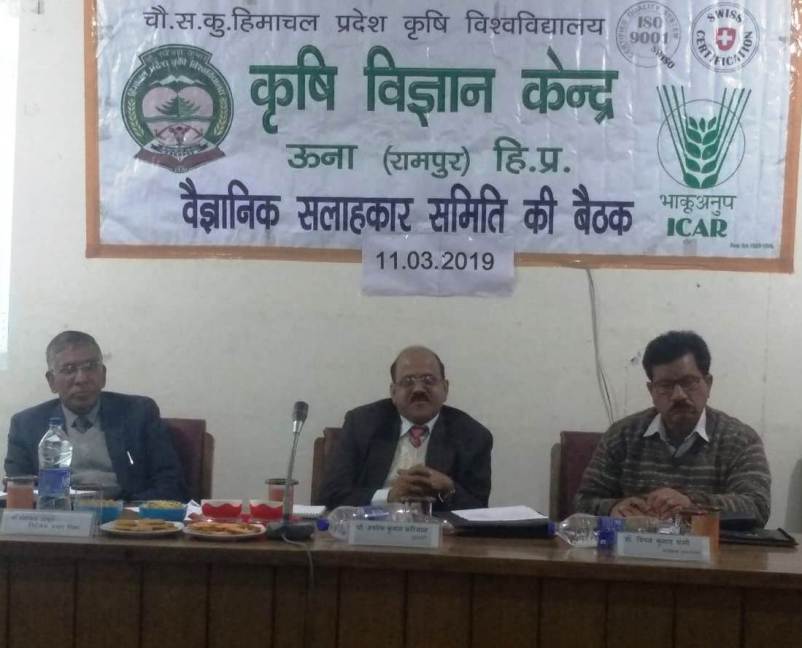
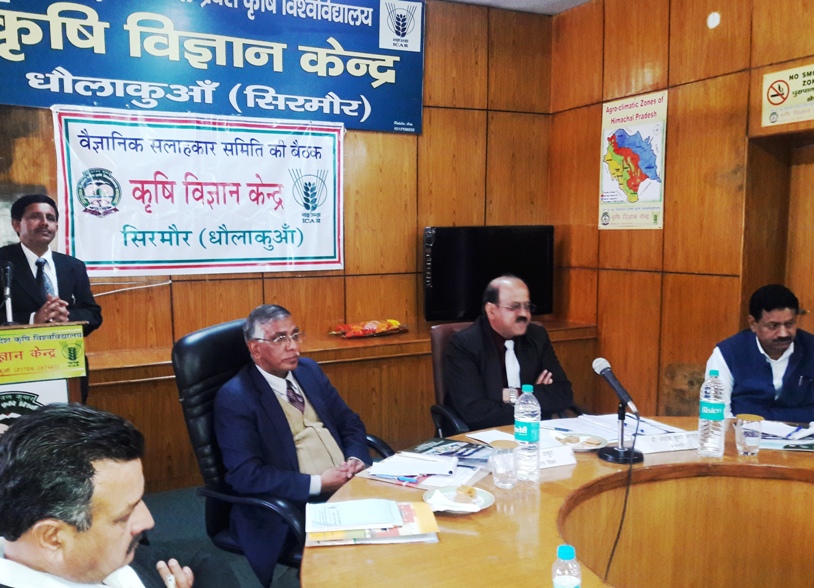
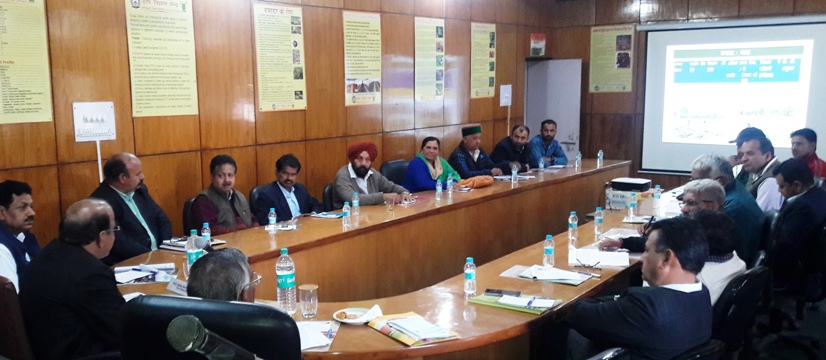
Scientific Advisory Committee meetings in progress at KVK, Dhaulakuan and Una
**********************************
Last Updated: March 06, 2019
Media Cell
Press Release
No. QSD/MC/298 Dated: 07.03.2019
Scientific Advisory Committee Meetings at KVKs at Berthin & Bara
Vice Chancellor Prof. A.K. Sarial asks to disseminate information about natural farming
Palampur 7 March. Prof. Ashok Kumar Sarial, Vice Chancellor, CSK Himachal Pradesh Agriculture University has asked the scientists, farm officers and progressive farmers to disseminate knowledge about natural farming among farming community. The Vice-Chancellor was addressing them during scientific advisory committee meetings of Krishi Vigyan Kendras of the University at Berthin (Bilaspur) and Bara (Hamirpur).
Prof. Ashok Kumar Sarial while elaborating the efforts of the State Government in making Himachal Pradesh a leading natural farming State told that the University has also initiated research and awareness programmes in this direction. Around twenty percent of experiment farm under KVKs have been brought under natural farming and regular exposure visits were conducted for the farmers. He said that farm scientists and all those district level officers who directly deal with farmers, need to educate them about this healthy and eco-friendly farming which will enable the farmers to double their income as envisaged by the governments of India and Himachal Pradesh.
He also spoke on the importance and need to supplement the income of farmers with agricultural based avocations like mushroom cultivation, poultry farming, bee-keeping, etc. The Vice-Chancellor said that young farmers should be made aware about the start-up schemes so that they may get training and become successful entrepreneurs.
Dr.Y.P.Thakur, Director of Extension Education, told that Agricultural Skill Council of India, had sponsored eleven trainings for enhancing the farming skills of the farmers and these have been organised productively. He said that Krishi Vigyan Kendras were major hub for district based farm trainings and demonstration for the farmers and they should avail expert advice of extension specialists to increase their farm production.
Drs Suman Kumar and Pardeep Kumar, Programme Coordinators presented report of the activities undertaken in the last one year. Proposal for the next year were finalised with inputs from the members representing departments of Agriculture, Horticulture, Animal Husbandry, Forestry, banks, etc.
**********************************
Last Updated: March 06, 2019
Media Cell
Press Release
No. QSD/MC/297 Dated: 06.03.2019
Vice Chancellor Prof. A.K. Sarial distributes 22 breeding bucks to nomadic Gaddi goat farmers
Palampur 6 March. Prof. A.K. Sarial, Vice Chancellor, CSK Himachal Pradesh Agriculture University has appreciated the migratory Gaddi nomads for helping in bridging the gap for fulfilling the demand for quality meat to the consumers in the State. The Vice-Chancellor was interacting with progressive Gaddi nomads after distributing 22 Gaddi breeding bucks to them, here today.
The bucks were provided under the ongoing All India Co-ordinated Research Project on Goat Improvement (Gaddi Field Unit) for breed improvement of the existing Gaddi goats of the State running in the Department of Animal Genetics and Breeding, Dr.G.C.Negi College of Veterinary & Animal Sciences (COVAS). Prof Sarial told that Gaddi goat meat was of high quality as the goats feed on wild vegetation in high altitude areas free from any chemical use in such grazing lands. He asked the scientists to help the Gaddi nomads in marketing of quality meat and asked the farmers to fully utilize the potential of the breeding bucks being provided to them. He also underlined the utility of the project to the farmers.
The Vice-Chancellor appreciated Dr. P.K. Dogra, Principal Investigator of the project and his team for their hard work under migratory field conditions for the benefit of tribal farmers.
Dr. P.K. Dogra said that the university was serving the nomadic Gaddi goat farmers through this project for the last eight years. This project is being implemented under the umbrella of Central Institute for Research on Goats located at Makhdoom, Mathura. The unit provided 22 breeding bucks to 22 different farmers from Kangra, Chamba and Mandi districts of the state for breed improvement of their flocks. This year the Gaddi field unit carried out research on 1152 Gaddi goat of four field units and recorded different production and reproduction parameters. The selected flocks were monitored throughout the year by providing breeding, health care and nutritional inputs. All selected animals were provided health coverage under migratory field conditions viz. vaccination against goat plague, de-worming, periodic health checkups etc. Strategic supplementary feeding was also provided in the form of mineral mixture and concentrate feed.
Dr. Y.P. Thakur Director Extension Education and Research, Dr. Mandeep Sharma, Dean, COVAS, Dr.R.K.Agnihotri, Dean, Post Graduate Studies, Dr Virender Patial, Assistant Director Animal Husbandry and Drs Varun Sankhyan, Parveen Sharma, Ankaj Thakur and Nishant Verma, all team members, were present during the ceremony.
**********************************
Last Updated: March 05, 2019
Media Cell
Press Release
No. QSD/MC/296 Dated: 05.03.2019
CSKHPAU Veterinary Scientists organize animal infertility treatment camps in District Solan
Palampur 5 March. A team of veterinary scientists from CSK Himachal Pradesh Agriculture University organized nine infertility treatment camps in different parts of district Solan, last week. The camps were organized in collaboration with State Department of Animal Husbandry at Bag Ka Jubar, Kunihar, Wakna, Ruhra, Kuthar, Kot, Chaha, Gunai and Lodhi-Majra villages under Rashtriya Krishi Vikas Yojna(RKVY) project to investigate status of infertility in bovines of Himachal Pradesh.
Prof. Madhumeet Singh, head of the Department of Veterinary Gynaecology and
Obstetrics and team leader, told that around 200 cows and buffaloes were
examined in these camps with main emphasis to record reproductive status and
abnormalities in bovines reared by the farmers in this district. The
scientists collected blood samples to study their minerals, biochemical and
hormonal profile and also genital discharge samples for detailed diagnosis
of uterine infections. Faecal samples were also collected to study the
parasitic load in animals in this area and their relationship with
infertility. Free medicines were distributed to the farmers.
He informed that department is rendering specialized services to the farmers in different parts of the State for treatment of various reproductive disorders with an aim to reduce incidence of infertility. Since last six years, scientists have organized 245 infertility treatment camps under RKVY projects in diverse parts of Himachal Pradesh, including around 90 camps in tribal and other very remote locations. Around 6000 cows and buffaloes have been examined and treated in these camps. Around 1200 blood, 700 uterine discharge and 500 fecal samples have been collected and analyzed for detailed investigations of various diseases. Area wise mapping of reproductive ailments through clinic-gynecological examination, nutritional deficiencies through blood investigations, parasitic infestation responsible for reproduction problems and micro flora responsible for uterine infections is being done.Besides Prof. Madhumeet Singh, the team members included Dr. Pravesh Kumar and Mr. Vijay Rana from the Department of Veterinary Gynaecology and Obstetrics.
Prof Ashok Kumat Sarial, Vice-Chancellor, while appreciating the team, expressed his happiness that in the last six years, veterinary scientists from department have organized 245 infertility treatment camps in different parts of Himachal Pradesh, including around 90 camps in tribal and other very remote locations.
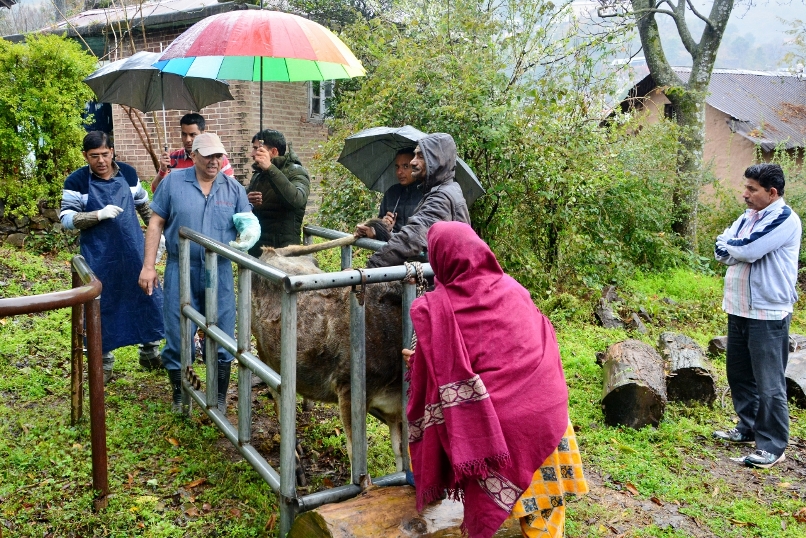
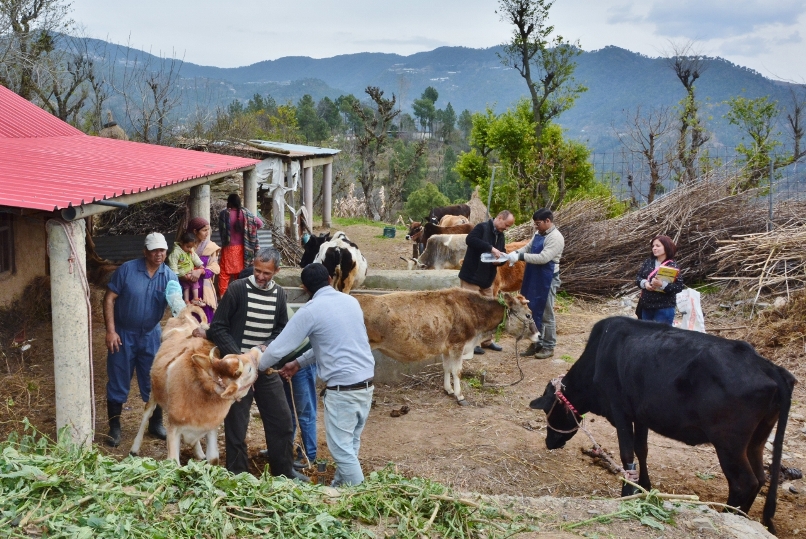
**********************************
Last Updated: March 02, 2019
Media Cell
Press Release
No. QSD/MC/295 Dated: 02.03.2019
Vice-Chancellor Prof Ashok Kumar Sarial exhorts scientists to apply science with wisdom
Palampur 2 March. Prof. A.K. Sarial, Vice Chancellor, CSK Himachal Pradesh Agriculture University has asked the scientists and students to apply science with wisdom and help in preserving the environment to save the earth for future generations. He was addressing them during the concluding ceremony of national science day celebrations in the university, here today.
Prof Sarial, himself a well known farm scientist, also detailed the contributions of agricultural scientists in making the country self-reliant on food front. He also highlighted the contributions of scientists for the welfare of mankind. The Vice-Chancellor appreciated the College of Basic Sciences for organizing various activities and also awarded the winners of competitions. He also released a science booklet by Drs. Rishi Mahajan and Dr. Abhishek Walia.
Dr. ( Mrs.) Promila Kanwar, Dean, asked the students to pursue the science as a career for nation building. Prof. D. K. Dhawan from Panjab University, Chandigarh delivered a lecture on the theme "Science for people and people for Science".
Dr. Ranbir Singh Rana, Coordinator, told that during the four days event, besides science based competitions, the students also organized a cultural programme.
Dr. S.S.Kanwar, Professor Emeritus, Indian Council of Agricultural Research, University statutory officers and scientists were present during the prize distribution ceremony.
In declamation contest Shorya(COA), Aditya (COA) and Samriti( COBS) were declared first, second and third respectively. In Poster making, Kareena Verma ( COBS), Nitish Gaytri (COVAS) and Shefali Chandel( COVAS) were adjudged first, second and third respectively ; whereas in Quiz Competition teams of Rajat Masand and Sanyav Bhardwaj from COVAS, Shailja Kumari and Sunidhi from COBS and Navedita and Rajender from COHS were adjudged as first, second and third respectively. Sarya Sharma(COBS), Neha Chauhan(COA) and Abhishek Rana(COBS) were winners as first, second and third in power point presentation.
**********************************
Last Updated: February 22, 2019
Media Cell
Press Release
No. QSD/MC/291 Dated: 22.02.2019
CSKHPAU and BARC sign MoU for innovative research activities
Palampur 22 February. CSK Himachal Pradesh
Agriculture University and Bhabha Atomic Research Centre (BARC), Mumbai have
entered into a Memorandum of Understanding (MoU) for strengthening linkages
between nuclear agriculture and biotechnology. MoU was signed by Prof Ashok
Kumar Sarial, Vice-Chancellor, CSKHPAU and Dr V.P.Venugopalan, Head, Nuclear
Agriculture and Biotechnology Division, BARC.
Prof Ashok Kumar Sarial, Vice-Chancellor said that linkages between these
two premier institutes will be strengthened through various collaborative
efforts on "Breeding of new crop varieties, evaluation, release,
notification and popularization". The crops focused for this endeavour will
be wheat, rice, urd, mungbean, pigeonpea, soybean and cowpea. He told that
this collaboration will open new horizons for taking up innovative research
activities of mutual interests in agriculture, sharing of human resource,
technical expertise and radiation facilities. It will be a unique
opportunity to conduct the visit of post graduate students to acquire
acquaintance with the on-going activities in BARC and harness the mutation
breeding expertise for masters and post -doctoral research. Prof Sarial said
that the idea for collaboration and signing MoU was mooted by him during the
visit of a team of BARC scientists last year and sincere efforts will be
made to establish radiation facilities at the university to cater to the
needs of entire North-Western Himalayan hill States for future mutation
breeding programmes and providing assistance for food crops, temperate
fruits and vegetables processing and protection endeavours. The BARC has
been informed that this facility will enable it to have a platform to get
its mutation inducted new crop varieties screened in North-West Himalayan
regions and get the elite genotypes released and popularized amongst the
stakeholders.
Recently, Dr. Sanjay J. Jambhulkar, Head, Mutation Breeding Section, BARC, held discussions with the Vice-Chancellor, Dr. Y.P. Thakur, Director of Research and Dr. H.K. Chaudhary, Professor and Head, Department of Crop Improvement.
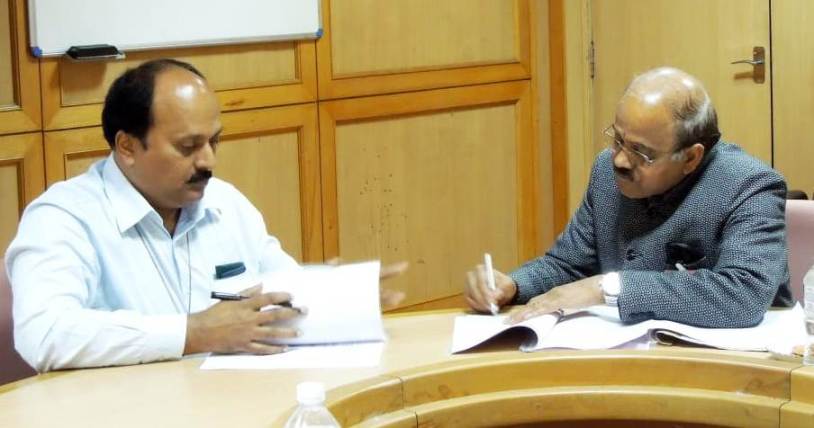
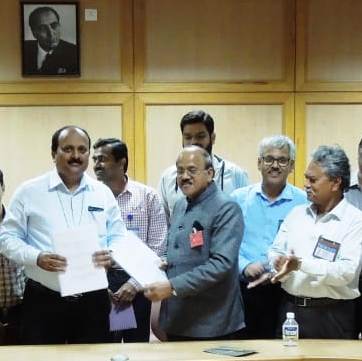
Vice-Chancellor Prof A.K.Sarial and Dr V.P.Venugopalan signing MoU at BARC, Mumbai
**********************************
Last Updated: February 16, 2019
Media Cell
Press Release
No. QSD/MC/291 Dated: 16.02.2019
International Conference on Wheat concludes at CSKHPAU
Prof Ashok Kumar Sarial exhorts scientists to judiciously utilize resources for the benefit of farming community
Palampur 16 February. Three days International Group Meeting on Wheat concluded at CSK Himachal Pradesh Agriculture University, here today.
Chief Guest of the valedictory function Prof Ashok Kumar Sarial, Vice-Chancellor said that wheat productivity enhancement through climate smart practices was the need of the hour. The research findings of top scientists working on wheat crop would be much useful to other scientists and post graduate students. He said that limited financial resources should be optimally and judiciously used in research for the benefit of farming community. He also underlined the importance of international collaborations for the progress of science. The Vice-Chancellor said that such international events should be organized more frequently as wheat was very important crop in India and other countries.
Shri Ranbir Singh, Chief General Manager, National Bank for Agriculture and Rural Development (NABARD) told that such meets were able to generate discussions for future research issues which ultimately were helpful for the farming community in enhancing the crop production.
Prof Ian King from University of Nottingham, UK said that the meet has been extremely successful with valuable discussions among the scientists.
Dr Sindhu Sareen, Organizing Secretary and Dr H.K.Chaudhary, Local Organizing Secretary informed that major recommendations of the meet were use of wild crops related to wheat for improvement of this crop, speed breeding, more emphasis on mutation breeding, double haploidy breeding, national facility for developing new varieties in shortest possible time in collaboration with international institutes should be created at Palampur for the benefit of scientists, strict vigilance at Indo Banagladesh border for wheat blast, research for enhanced productivity, development of specific genotypes, suitable varieties for different agro-climatic zones, making farmer aware about effects of climate change, development of zinc and iron rich varieties, etc.
Chief Guest Prof Ashok Kumar Sarial also awarded winners of best poster presentation on different research themes on wheat. The winners from different institutes included Bhawna (Hissar, Dr Poonam Jasrotia(Karnal),Dr Amit Gautam (Morroco), Dr Gaurav(Palampur), Dr Sneh Narwal( Karnal) and Dr Bhumesh( Karnal).
Around 200 scientists from UK, Australia, Canada, Mexico, Jordon, Morocco and India deliberated during the mega scientific meet.
A view of the dais and galaxy of scientists and poster award ceremony
**********************************
Last Updated: February 15, 2019
Media Cell
Press Release
No. QSD/MC/290 Dated: 15.02.2019
International Conference on Wheat: Second Day
Experts discuss ways to mitigate climate change effects on wheat
Palampur 15 February. The scientists taking part in the International Group Meeting on Wheat has discussed ways and means to mitigate effects of climate change on wheat production. It was agreed that speed breeding was an important tool which could be used for advancement of generations.
Dr Ian King, Professor of Cereal Genomics, University of Notttingham, UK emphasized the use of wild taxa for introgression of novel genes for various biotic and abiotic stresses into cultivated bread and durum wheat background. Prof A.K.Sarial, Vice-Chancellor of the host University spoke on speed breeding. Dr. J.K. Roy, Scientist, National Agri-food Biotechnology Institue, Mohali dealt with characterization and use of genes controlling amylose content, pigmentation in colored wheats and phytate biosynthesis. Dr GP Singh, Director IIWBR, stressed upon the need of following the guidelines under the National Seed Act before commercialization of biofortified colored wheats. Dr. Parveen Chhuneja, Director, School of Agriculture Biotechnology, Punjab Agriculture University, Ludhiana highlighted the wide hybridization programme aimed at transfer and deployment of disease resistance genes and presented a detailed account on use of modern biotechnological tools like. Dr. Sanjay J Jambulkar, Bhaba Atomic Research Centre, Mumbai discussed the use of nuclear energy for peaceful purposes by the way of production of mutagenized populations of wheat varieties. Prof. H K Chaudhary, Head, Deptt of Crop Improvement and Agricultural Biotechnology from the host University detailed five decades journey of Double Haploidy Breeding in wheat and new frontiers in the sphere of Chromosome elimination- mediated Double Haploidy Breeding. DH 114 (Him Pratham), the first Doubled Haploid wheat variety developed by the H.P. Agriculture University has opened a pathway to accelerate the varietal development programmes in bread and durum wheats.
Other major topics discussed were utilization of wild species of wheat for wheat improvement, issues related to biotic and abiotic stresses, genetic manipulation of wheat for different quality traits, application of induced mutagenesis for sustain, double haploid breeding, speed breeding, drought and heat tolerance and taming the wheat blast disease in wheat were also discussed. Dr.H.C.Sharma, Vice-Chancellor, Dr Y.S.Parmar University of Horticulture and Forestry, Solan Prof A.K.Sarial, Vice-Chancellor of the host university; Dr.P.K.Sharma, Vice-Chancellor, Sher-e-Kashmir University of Agriculture and Technology, Jammu and Dr S.K.Sharma, former Vice-Chancellor chaired the technical sessions and Dr. Michael Baum, Director from International Centre for Agriculture Research in Dryland Areas (ICARDA), Morocco; Dr Harbans S Bariana, University of Sydney, Australia; Dr Pawan K.Singh, Scientist form International Maize and Wheat Improvement Centre , Mexico, etc were key note speakers.
Dr Ian King, University of Notttingham, UK and Dr H.C.Shamra,Vice-Chancellor, UHF, Solan making presentations
**********************************
Last Updated: February 15, 2019
Media Cell
Press Release
No. QSD/MC/289 Dated: 15.02.2019
Agriculture Technology Demonstration Fair at Padhiarkhar
Farm mechanization needed to reduce drudgery and increase production: Prof Ashok Kumar Sarial
Palampur 15 February. CSK Himachal Pradesh Agriculture University organized ‘Agriculture Technology Demonstration Mela at village Padhiarkhar, around 6 KMs from Palampur today. Chief Guest Prof. Ashok Kumar Sarial, Vice-Chancellor, while addressing the farming community from the local and surrounding villages, said that farm mechanization was a must to reduce farm drudgery and increase farm production. He asked the farmers to adopt improved farm machines and tools developed by the university as these were suitable for the hilly terrain of Himachal Pradesh. If any entrepreneur comes forward to start small farm tools industry, the University will help him. The Vice-Chancellor said that it was a challenge for the farm officers and scientists to double the income of farmers which they need to accept and come out with technologies to strengthen socio-economic status of farmers. He also appreciated the role of farm women in hill agriculture and also spoke on the importance of natural farming, animal husbandry etc and asked farmers to seek advice of scientists and farm officers for scientific farming.
Dr.Y.P.Thakur, Director of Research and Extension Education, told that research work was in progress on farm machinery and tools, poly-houses, renewable energy, ergonomics and safety in agriculture, post harvest technology and such technology can certainly boost farm production.
Dr.R.K.Gupta, Head of Agricultural Engineering department, told that as per the instructions and support from the Indian Council of Agricultural Research, such Agriculture Technology Demonstration Fairs have been organized today all over the country. He elaborated about small farm tools to reduce drudgery.
Drs.R.S.Rana and Radhna Gupta also elaborated about farm mechanization. Dr J.S.Guelria, Professor Emeritus, Dr.J.P.Saini, Head, Organic and Natural Farming, Dr Vijay Awasty, Subject Matter Specailist and some other scientists from the University and Officers from the State Department of Agriculture and villager also actively took part in the Mela. Around two hundred farmers evinced interest in the demonstration exhibition. They also sought answers to their farm related problems from the scientists.
A view of the farmers and Vice-Chancellor addressing the farmers and having a round of exhibition
**********************************
Last Updated: February 15, 2019
Media Cell
Press Release
No. QSD/MC/288 Dated: 15.02.2019
Afghanistan farm officials at CSKHPAU
Palampur 15 Februrary. A group of eight officials working for agriculture development in Afghanistan was on an exposure-cum-study tour for four days to CSK Himachal Pradesh Agriculture University. They were imparted training in modern farm production techniques including protected cultivation, animal husbandry ,etc by the university scientists. They also interacted with Prof Ashok Kumar Sarial, Vice-Chancellor, who exhorted them to work sincerely for agriculture development in their country. The officials thanked the University and Dr.Y.P.Thakur, Director Extension Education for organizing the training to them.
Farm officials from Afghanistan with Prof A.K.Sarial, Vice-Chancellor and Dr Y.P.Thakur, Director of Extension Education
**********************************
Last Updated: February 14, 2019
Media Cell
Press Release
No. QSD/MC/287 Dated: 14.02.2019
International Conference on Wheat begins at CSKHPAU
Prof V.L.Chopra suggests international research collaborations to enhance wheat productivity
Palampur 14 February. International Group Meeting on Wheat with the participation of over two hundred scientists from seven countries began at CSK Himachal Pradesh Agriculture University, here today.
Chief Guest Padam Bhushan Prof V.L.Chopra, a well known scientist and former Director General, Indian Council of Agricultural Research and former Member of Planning Commission, in his inaugural address, said that wheat productivity enhancement through climate smart practices was a timely and an important issue. He said that wheat productivity was at apex point so to take it to next level was a challenge for the scientists. To break the yield level, work should be done to allow the plant to produce more biomass. He also suggested international collaboration on research issues as all were scientists were better equipped to work on wheat. The Chief Guest said that time has come to sit back and reorient modify operating procedures. Dr Chopra suggested strategic national programs and taking the outcomes for international collaborations as global climatic changes were imposing new kind of problems.
Guest of Honour Dr. Michael Baum, Director, Biodiversity and Crop Improvement, International Centre for Agriculture Research in Dry land Areas (ICARDA), Morocco elaborated about the role of his organization in wheat breeding and advancement of agriculture. He said that India was an important country for farm research. There was one global wheat program to avoid duplication. Dr Baun said that research emphasis should be on rain fed production and diseases like yellow rust. He said that support of government for wheat production was an important factor to scientists all over the world.
Prof Ashok Kumar Sarial, Vice-Chancellor of the host University, informed that India was second highest wheat producer in the world. He told that wheat was grown all Himachal Pradesh occupying sixty five percent cultivable area. The State was ideal for speed breeding as two crops were raised in a year. He hoped that the international meeting will be useful to the University scientists especially post-graduate students as they would get acquainted with modern technologies needed for mitigating changing climatic effects on wheat productivity and interact with top scientists of the world.
Dr.G.P.Singh, Director, Indian Institute of Wheat and Barley Research (IIWBR), Indian Council of Agricultural Research Karnal told that earlier research had been concentrated on increasing the wheat production but now emphasis is on value addition, etc. and finding solutions to new diseases for this important crop.
Dr.Pawan Kumar Mehta, Dean, College of Agriculture, Dr Sindhu Sareen, Organizing Secretary and Dr H.K.Chaudhary, Local Organizing Secretary also detailed about the international group meet and told that the event was being organized jointly by CSKHPAU, IIWBR, Karnal and Society for Advancement of Wheat and Barley Research with the participation of more than 200 prominent scientists from UK, Australia, Canada, Mexico, Jordon, Morocco and India. The Chief Guest also released some publications.
A view of the dais and galaxy of scientists, lighting of lamp, release of publications and honour ceremonies
**********************************
Last Updated: February 08, 2019
Media Cell
Press Release
No. QSD/MC/285 Dated: 08.02.2019
Press Conference of the Vice-Chancellor
CSKHPAU to host International Conference on Wheat from 14-16 February : Vice-Chancellor Prof Ashok Kumar Sarial
Palampur 8 February. Prof Ashok Kumar Sarial, Vice-Chancellor, informed that an International Group Meeting on Wheat with the participation of over two hundred scientists from seven countries will be organised from 14-16 February at CSK Himachal Pradesh Agriculture University. He disclosed this during a press conference, here today.
The Vice-Chancellor told that this prestigious event was being organised for the first time in Palampur as it is organised once in a five years in any country and it will be jointly organised by his university, Indian Institute of Wheat and Barley Research (IIWBR), Karnal and Society for Advancement of Wheat and Barley Research (SAWBAR) with the participation of top scientists from UK, Australia, Canada, Mexico, Jordon, Morocco and India. The main theme of the meet will be, "Wheat productivity enhancement through climate smart practices" with six sub themes on 'Genetic manipulation to mitigate efforts of climate change'; 'Biotic stress in changing climate scenario'; 'Abiotic stresses in relation to climate change'; 'Resource optimization for enhanced productivity'; 'Changing food habits and value addition for quality improvement' and 'Impact of climate change on adoption and sustainable production'. Prof Sarial said that main focus of discussions will be on the integrated, conventional and modern technologies mediated breeding for mitigating effects of climate change and expressed the hope that the event will open many avenues for collaborations among the institutes and scientists. He told that the University has taken care to involve post-graduate students in a good number so that they get acquainted with modern technologies needed for mitigating changing climatic effects on wheat productivity and interact with top scientists of the world. The meet will be inaugurated by eminent scientist Padam Bhushan Prof V.L.Chopra, former Director General, Indian Council of Agricultural Research and Dr. Martin Kropff, Director General, International Maize and Wheat Improvement Centre (CIMMYT), Mexico will be Guest of Honour.
Prof Sarial also informed that the University has recently appointed eleven assistant professors in the constituent colleges. The interviews were conducted in January itself and the process of selection was completed swiftly. Seven teachers have been appointed in the College of Basic Sciences. It is after decades that recruitments have been done in this college which attracts a large number of meritorious students from all over the State. Three teachers have been appointed in the College of Agriculture and one in the College of Home Science. He told that the process to fill-up posts of fifty teachers and non-teachers each was underway.
The
Vice-Chancellor also gave information about the selection of his University
by the Union Ministry of Agriculture and Farmers' Welfare for establishing
an 'Agri Business Incubator' worth Rs. Nine crore under a scheme 'Rashtriya
Krishi Vikas Yojna- Remunerative Approaches for Agriculture and Allied
Sector Rejuvenation' (RKVY-RAFTAAR).
Dr Hirday Paul Singh, Joint Director (Information & Public Relations) welcomed the reporters and Dr Ashok Kumar, OSD to the Vice-Chancellor thanked them.
Prof Ashok Sarial holding the Press Conference and Reporters
**********************************
Last Updated: February 05, 2019
Media Cell
Press Release
No. QSD/MC/282 Dated: 05.02.2019
Trainings on the job role of small poultry farmer at COVAS & KVK Kangra
Vice-Chancellor Prof Ashok Kumar Sarial underlines the importance of scientific trainings and skills for becoming successful entrepreneur
Palampur 5 February. Prof Ashok Kumar Sarial, Vice-Chancellor, inaugurated a month long training program on the job role “Small poultry farmer” at Dr G C Negi College of Veterinary and Animal Sciences (COVAS), CSK Himachal Pradesh Agriculture University, here today. While addressing trainees and scientists, the Vice-Chancellor said that to be successful in any avocation, practical knowledge of scientific techniques and skills was a prerequisite in this era. He told that Governments of India and Himachal Pradesh were helping farmers in raising their socio-economic status by sponsoring professional trainings and many other programs. He asked the farmers to learn every aspect of poultry farming carefully as their skills will be evaluated by an independent agency after a month long training and successful trainees will be awarded certificates useful for bank loans, etc. The Vice-Chancellor also appreciated the ladies and young farmers from faraway places for voluntarily taking part in the training and expressed the hope that such trainees will also extend newly acquired skills among other villagers of their areas. The Vice-Chancellor said that such trainings were very useful for self employment and becoming successful entrepreneurs. He asked the trainees to be in touch with university scientists and specialists for further guidance and solving their farm related problems.Dr Mandeep Sharma, Dean, COVAS, as guest of honour asked the farmers to learn the skills of poultry farming for becoming successful entrepreneurs. He told that there was huge demand of eggs and poultry meat in the State as it was good source of quality protein. He told that a dairy farming training was also organised recently.Dr Yash Pal Thakur, Director of Extension Education, told the training has been sponsored by the Agricultural Skill Council of India. It was the last training among eleven trainings sponsored by the council and all trainings were organised productively. He also elaborated on the importance of poultry farming and informed that after successful completion of the training, trainees can start their own poultry enterprise availing various benefits available under government schemes for promotion of poultry farming.
Dr A.K.Panda, course director, told that twenty livestock keepers from all over the State were taking part in the 240 hours program. Drs Devesh Thakur and Manoj Sharma also expressed their views.The Vice-Chancellor released a booklet on dairy farming. Dr Pawan Kumar Mehta, Dean, College of Agriculture, Dr Jagtar Singh Guleria, Professor emeritus, Dr Hirday Paul Singh, Joint Director(Information & Public Relations), scientists and some students also attended the inaugural ceremony.Later, the Vice-Chancellor was Chief Guest in the concluding ceremony of month long training program on the job role "Small poultry farmer" at Krishi Vigyan Kendra, Kangra where he addressed the trainees and distributed participation certificates to them. Dr.Y.P.Thakur, Director of Extension Education, Dr Vishal Dogra, Programme coordinator, Dr Rakesh Thakur, course coordinator and other extension specialists were present during the concluding ceremony at KVK,Kangra.
**********************************
Last Updated: January 31, 2019
Media Cell
Press Release
No. QSD/MC/281 Dated: 31.01.2019
Conference on Food Processing at CSKHPAU
Palampur 31 January. A day long training program-cum-conference on ‘Medium, Small and Micro enterprises in food processing’ was organized jointly by the Associated Chamber of Commerce and Industry in India (Assocham) and CSK Himachal Pradesh Agriculture University, here today.
Around fifty farmers from district Kangra, scientists and students from the College of Home Science participated in the conference. The experts educated the participants about food value chain, food processing industry, technology, import and export procedures, etc. which may help them upscale their skills to increase the income.
The conference was inaugurated by Dr S.K.Sharma, former Vice-Chancellor who underlined the importance of food processing and value addition for enhancing income of the farming community. Dr.D.K.Vatsa, Director of Research gave details about the major crops of the State which can be used in food processing. Messers Harvinder Singh, Rajesh Kumar and Deepankar Khare detailed about banking and industry schemes. Dr Sangita Sood also addressed the participants.
Pic caption: A view of the dais and audience
**********************************
Last Updated: January 28, 2019
Media Cell
Press Release
No. QSD/MC/281 Dated: 26.01.2019
Prof A.K.Sarial, Vice-Chancellor unfurls the National Flag
Republic Day celebrated with enthusiasm and gaiety at CSKHPAU
Palampur 26 January. The Republic Day was celebrated with enthusiasm and gaiety at CSK Himachal Pradesh Agriculture University, here today.
Prof Ashok Kumar Sarial, Vice-Chancellor, unfurled the National Flag and took salute from the impressive NCC contingent comprising well uniformed platoons of boys and girls. Later, in his address to the University community, the Vice Chancellor underlined the importance of democracy and detailed rights and obligations enshrined in the constitution of India. He also spoke on the tremendous progress made by the country and Himachal Pradesh, especially on the food front. He told about the recent achievements of the University in academics, research and extension education and appreciated the NCC cadets for their impressive parade. Prof Sarial also presented prizes to the blood donors, winners of hostel competitions and master of ceremonies of youth festival. He also awarded the students of Holy Mission Public School, Chachian with a cash prize of Rs five thousand for their performance with school band during the programme.
The students of the constituent colleges presented patriotic songs, dances and solo performances. Sweets were distributed after the ceremony.
SWO Dr Ashwani Goel, other statutory officers, heads, teaching and non-teaching employees and students were present in a large number in the ceremony.
Vice-Chancellor Prof A.K.Sarial taking salute from the NCC contingent
Vice-Chancellor Prof A.K.Sarial addressing the University community and spectators
**********************************
Last Updated: January 17, 2019
Media Cell
Press Release
No. QSD/MC/277 Dated: 17.01.2019
CSK HPAU water management technologies may prove helpful to H.P. in implementing irrigation schemes worth Rs 9599 crore for assured irrigation to sixty percent of farmland
Palampur 17 January. "The government of Himachal Pradesh has introduced ambitions irrigation schemes in the last one year. When implemented fully, these are bound to revolutionize farm production" believes Prof A.K.Sarial, Vice-Chancellor, CSK Himachal Pradesh Agriculture University. He told that the major irrigation schemes worth Rs 9599 crore introduced were Pradhan Mantri Krishi Sinchai Yojana ("Har Khet Ko Pani- More crop per drop") Jal se Krishi ko Bal, Flow Irrigation Scheme and Solar Irrigation Scheme. One of the schemes with budget outlay of Rs 4848 crore aimed at renovation of old irrigation system while another with budget outlay of Rs 4751 crore to be implemented in four phases by constructing small and medium sized dams and barrages across rivers and rivulets, and check dams and tanks (polythene lined or concrete tanks to store thousands of liters of water) and use the stored water by lift irrigation and or gravity.
He says that water is one of the most vital natural resources of Himachal Pradesh and the State is richly endowed with a hilly terrain having an enormous volume of water. Country's five major rivers namely Sutlej, Beas, Ravi, Yamuna and Chenab originate from Himachal Pradesh and irrigate 98 percent land in Punjab, 84 percent in Haryana, 27.5 percent (55 lakh hectare ) in Rajasthan and even across the border in Pakistan but merely 19 percent (1.13 lakh hectare ) of the cultivated area in H.P. The area under irrigation more or less remained constant in the State affecting overall productivity of agricultural and horticultural crops. It is with this concern during the Vice Chancellors' conference in 2017 Prof Sarial mooted an idea to the NITI Ayog expert Prof. Ramesh Chand to bring at least 10 percent of the total cultivated area of the State under irrigation every year raising it from 19 percent to 69 percent over a period of five years so as to achieve the target of doubling farmers' income. He also proposed it in the State panning board meeting in February 2017. According to Prof Sarial the realized average productivity has been estimated two and half to three times in irrigated system over un-irrigated rain fed. Most of the rains (about 80 percent) received during monsoon from June to September lead to excess water and rest (20 percent) received during the year lead to deficit moisture conditions affecting adversely the timely sowing in the months of May-June and October-November.
He told that CSK H.P. Agriculture University, Palampur has developed a number of technological interventions of water harvesting, storage, conservation and use and will assist the government in implementing new irrigation schemes and their adoption at a larger scale by the farmers. Developing water harvesting, storage, conservation and farmer- friendly technologies has been a great challenge for farm scientists and the first model watershed developed at Palampur after establishment of University. It has four major and ten minor water reservoirs with the total capacity of about 25000 cubic meters water available after monsoons for providing 1-2 life saving surface irrigations to about 20 hectare area (Fig 1-2). Majority of these reservoirs and farm ponds have been polyethylene lined with cross laminated blue coloured UV resistant sheet of 200-250 GSM thickness. The poly-lining has been done to control the seepage losses with the objective of enhancing the water storage period after monsoon rains. To utilize the harvested rain-water efficiently, the water management research of University is now being focused on micro irrigation especially drip irrigation and solar irrigation (Fig 3-4) and the research findings on use of drip irrigation in vegetables in place of surface irrigation have shown superiority in term of water saving by 60-75 percent.
The University and the State Department of Agriculture are conducting training and exposure visits of farmers and extension personals regularly to familiarize with these techniques. The scientists from India and abroad have also visited the University to see these poly-lined farm reservoirs and ponds. Prof A.K.Sarial told that on completion of the irrigation schemes over the next five years period it is estimated that around 3.25 lakh hectare cultivable area would have assured irrigation raising productivity and production of field crops from two and half to three fold.
The Vice-Chancellor feels that technological interventions of water harvesting, storage, conservation and use be adopted and replicated on farmers' fields either on community basis or individual farmers' basis to enhance their income and shift the farmers from subsistence hill agriculture.
 |
 |
 |
 |
**********************************
Last Updated: January 10, 2019
Media Cell
Press Release
No. QSD/MC/276 Dated: 10.01.2019
Training for veterinarians concludes at CSKHPAU
Early diagnosis useful in preventing diseases & keeping animal productivity high: Vice-Chancellor Prof A.K.Sarial
Palampur 10 January. A four-days training programme on "Diagnostic Protocols in Veterinary Medicine for Veterinary Officers" of the State Department of Animal Husbandry concluded at CSK H.P. Agriculture University, here today.Chief Guest in the valedictory function Prof Ashok Kumar Sarial, Vice-Chancellor, underlined the importance of such refresher trainings as technology was advancing and latest disease diagnostic tools were designed at a frequent interval. He said that early diagnosis helped in preventing diseases and keeping animal productivity high for the benefit of livestock owners. He appreciated the Department of Veterinary Medicine, Dr GC Negi College of Veterinary & Animal Sciences (COVAS) for regularly organizing trainings for the veterinarians and farmers. The Vice-Chancellor also distributed participation certificates to the trainees. Dr.Mandeep Sharma, Dean, COVAS, Dr D. R. Wadhwa, training incharge and Dr Pradeep Sharma, training coordinator also addressed the trainees. Twelve senior veterinary officers from the districts of Shimla, Kangra, Hamirpur, Kinnaur and Chamba attended the training.
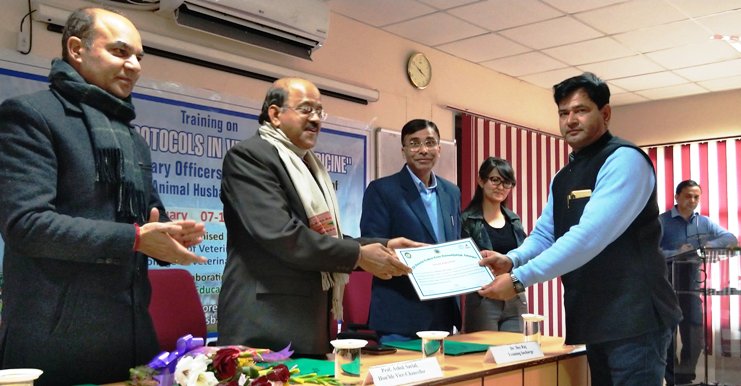
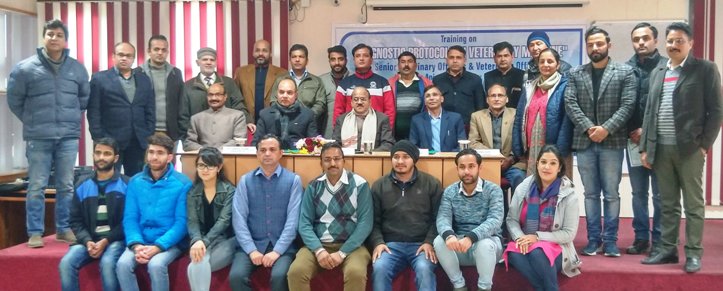
Last Updated: January 09, 2019
Media Cell
Press Release
No. QSD/MC/275 Dated: 09.01.2019
CSK H.P. Agriculture University taking lead in the country in Natural Farming research and extension activities
Palampur 9 January. CSK Himachal Pradesh Agriculture University has taken lead among all agricultural universities in the country by initiating research on natural farming.
The foundation stone of a model centre of Zero Budget Natural Farming (ZBNF) was laid one year back by the Governor of Himachal Pradesh-cum-Chancellor of the University in the presence of Chief Minister, Himachal Pradesh. The purpose was establishment of Gurukul (Kurukshetra) model of "Zero Budget Natural Farming" with the objectives to develop packages and practices, dissemination of ZBNF technology to the stakeholders and human resource development besides capacity building in the field of ZBNF.
Prof Ashok Kumar Sarial, Vice-Chancellor told that the university was guided from time to time by the Chancellor, who is an exponent of natural farming system and got full support from the State Government in initiating work on this altogether new farming system with the initial grant of Rs.300 lakh . In the very first year, the university has been able to rear a dozen Desi cows and has also procured half a dozen such other Desi local cattle of the state. Since Desi cow is most essential component of natural farming so the university is also in the process to procure additional five cows of Sahiwal , Gir or Redsindhi breeds, the known indigenous cow breeds of the country. He told that research work has also been initiated at all eight Krishi Vigyan Kendras (KVKs) of the University and KVKs Una and Kullu have especially been assigned work on it. Around twenty percent of experiment farm under KVKs have been brought under natural farming and regular exposure visits were conducted for the farmers. Thirteen Ph.D students are pursuing their research work on natural farming while a majority of Master students’ research synopsis have been finalized for investigation fully or partly on natural farming. Accordingly postgraduate research has been directed as per need of the State transforming it into natural and organic farming. He expressed the hope that the university will be able to develop a replicable model of ZBNF and will be able to demonstrate eco-friendly profitable production technologies under natural farming. Main purpose is economic upliftment of the small and marginal farmers through adoption of this eco-friendly model of farming as it is mantra for safe and nutritional food and essential for health security. He told that all out efforts will be made for large scale adoption of natural farming in the State with active collaboration of the State Department of Agriculture which has trained thousands of farmers covering all 3226 panchayats during the last year.
Prof Sarial informed that the university has submitted and was likely to be sanctioned soon another research project worth Rs. 420 lakh for "Evaluation, refinement & dissemination of technologies of Zero Budget Natural Farming (ZBNF) in H.P." The objectives were development of package of practices of ZBNF for wheat, maize, rice, gram, lentil, sugarcane, finger millet and foxtail millet and dissemination of technologies for livelihood security of the farm households of H.P. Conservation and multiplication of promising landraces of local germplasm of indicator crops of the State under ZBNF will be done under this project. Comparative study will be conducted on qualitative and quantitative population of total and beneficial micro flora in dung and urine of cow and yak and their comparative difference in Pahari, high yielding indigenous and cross bred cows. Study will also be carried out on the effect of ZBNF practices on soil health indicators and soil water dynamics, crop water use and water productivity over a period of time.
The Vice-Chancellor said that under the new project, standardization of insect pest and disease management practices and development of management schedule for indicator crops will be achieved besides doing comparative economic evaluation and cost of production of different enterprises under existing and ZBNF systems. He told that the University will also evaluate and make available superior indigenous cattle germplasm for demonstration and promoting suitable indigenous cattle breeds as an alternate to exotic dairy breeds and identification of unique bio-molecules of commercial and therapeutic interest in products like milk, colostrum, milk constituents and by-products. There will be availability of ZBNF responsive varieties well-tailored to need of farmers. He said that natural farming will help in the improvement in water availability and soil health status leading to the sustained crop productivity and the University will be able to develop effective ZBNF plant disease and insect-pest management technologies for the farmers. As this farming system will be able to make available chemical free quality produce to the consumers, it will also assist in socio-economic upliftment of small and marginal farmers of the State and the University will make serious efforts for the capacity building of farmers in natural farming.
A view of ZBNF centre at HPAU
Last Updated: January 02, 2019
Media Cell
Press Release
No. QSD/MC/274 Dated: 02.01.2019
Five students of CSKHPAU bag six awards in an International Symposium
Palampur 2 January. Five post-graduate students of CSK Himachal Pradesh Agricultural University bagged six awards for their research work during recently concluded international Symposium and Annual Convention of Indian Society for the study of Animal Reproduction held at Anand, Gujrat.
Prof. Madhumeet Singh, Head of the department Veterinary Gynaecology and Obstetrics told that out of total ten young scientist awards presented in the symposium, six awards were bagged by the University students. Dr. Anchal Rana received the best oral as well as the best poster presentation awards in female infertility session, Dr. Mohit Mahajan bagged the best oral presentation award in obstetrics session; Dr. Anushma received best poster presentation award in obstetrics session, Dr. Shriya Gupta for best poster in Andrology and Dr. Abhay Verma for best poster in pet, equine and wild animal reproduction sessions.
Prof Ashok Kumar Sarial, Vice-Chancellor has appreciated the students and their advisors namely Prof. Madhumeet Singh and Dr Pravesh Kumar and Dr R.K.Agnihotri, Dean Post Graduate Studies for bringing laurel to the university.

PG students with their medals and certificates
**********************************
Last Updated: January 01, 2019
Media Cell
Press Release
No. QSD/MC/273 Dated: 01.01.2019
A.K.Sarial exhorts staff to improve hard earned recognition at the national level and serve farmers dedicatedly
Palampur 1 January. Prof A.K.Sarial, Vice Chancellor, CSK Himachal Pradesh Agriculture University, has exhorted the staff to improve the hard earned recognition and accolades at National and State level and serve the farming community with renewed vigour and enthusiasm. He was addressing the scientists, non-teaching employees and students on the occasion of New Year, here today.
While enumerating various achievements in the mandated areas of academics, research and extension education, the Vice-Chancellor profusely expressed his gratitude to the State Government for liberal financial support to the University to run the affairs smoothly. He told that among all the farm varsities in the country, his university was ranked 19th by the Union Ministry of Agriculture and Farmers' Welfare besides getting all time 2ndposition in Agricultural Research Service(ARS) examination 2017 among all 75 farm varsities. He congratulated 109 students who cleared national level competitive examinations like National eligibility test(NET),ARS, GATE,CAT, JRF, SRF, etc this year and told that the ever increasing number of applicants for university academic programmes was an indicator of high quality education which needed to be maintained consistently.
Prof A.K.Sarial informed that the university was very first in the country to establish natural farming centre worth Rs three crore where research work has already been started and more than a dozen students have also been engaged in research work on natural farming. The University was committed to help in making Himachal Pradesh as natural farming state. While appreciating the scientists for bagging research projects, he told that three new crop varieties of wheat, soybean and mustard have been developed and recommended for release for the farmers of Himachal Pradesh. The University produced more than 800 quintal breeder seed of different crops including 600 quintal wheat seed which was sufficient to cover around 67 percent total wheat area in the state. Around 75 hectare area will be brought under seed production with a mega Rs.10 crore project. Forty four research projects worth Rs. 1155 lakh were sanctioned last year and total 145 research projects worth Rs. 4542 lakh were in operation. The university has almost doubled its domestic income from Rs.10 crore to Rs.19 crore.He said that around 1990 trainings were organized benefiting 53500 farmers.
He told that the government has given approval to fill-up 225 posts of teachers and non teachers and the process was underway to recruit the staff. He informed that recently the Indian Council of Agricultural Research has accredited the university for next five years and ISO has granted ISO certification for next three years. He congratulated all staff members for their performance and helping him to bring glory to the university and asked them to maintain the tempo for serving students and farmers devotedly.
Later, he organised a tea party to teaching and non-teaching staff members whose performance was ranked outstanding in 2018 and the scientists who bagged research projects worth Rs. Fifty lakh or more amount.
Vice-Chancellor Addressing the staff in auditorium
Audience
Group pic with outstanding staff members
**********************************